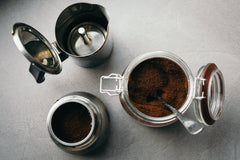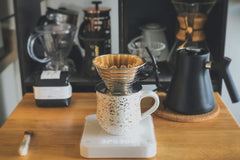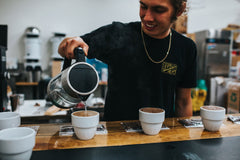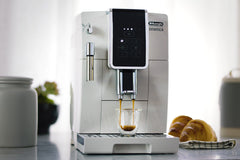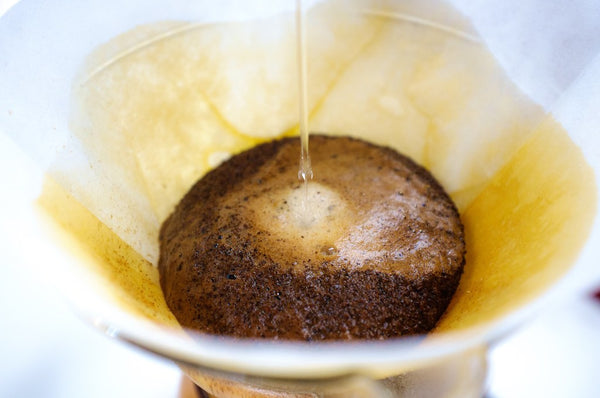
Table of Contents
- What You Need To Brew a Chemex Coffee
- Before You Start Brewing With Your Chemex
- How to make Chemex coffee
- STEP 1: Heat Water
- STEP 2: Place the Filter into the Brewer
- STEP 3: Wet the Filter Paper
- Step 4: Weigh and Grind The Coffee
- Step 5: Let it Bloom
- Step 6: Add More Water
- Step 7: Repeat Pour
- Step 8: Remove the filter
- Step 9: Serve and Taste
- Additional Chemex Coffee Brewing Tips
- What’s the Difference: Chemex vs. Pour Over?
The Chemex coffee maker remains an essential staple in the arsenal of all coffee lovers.
The timeless design has remained unchanged (wooden handle, leather, tapered glass, and everything in between) since its inception in 1941 by Peter Schlumbohm.
Schlumbohm's designs are described as "a synthesis of logic and madness", and we wholeheartedly agree. Chemex is part of MOMA's permanent design portfolio and was named "one of the best-designed products of modern times".
As such, the Chemex brewer is one the third-wave coffee's most recognizable icons.
Chemex coffee is similar to American drip coffee, but there is more room for error. To ensure the best results, grind your coffee beans more coarsely than you would with a ceramic drip and pay special attention to the rate of your pour.
This high level of care will result in a perfectly nuanced coffee with more than enough to share with friends.
WHAT YOU NEED TO BREW A CHEMEX COFFEE
- Chemex
- Chemex filter
- Gooseneck Kettle
- Burr Grinder
- Scale
- Timer
- Boiling hot water (about 200 ° F)
- Coffee ground medium-course
- Mug(s)
Coffee-to-Water ratio
- 1g coffee - 16ml water (e.g. 45g of coffee - 720ml water)
We recommend starting with a 1:16 coffee-to-water ratio. This will provide the best extraction level maximizing the flavor gained from the ground coffee. Do not hesitate to adjust the recipe to your taste - weaker or stronger.
Brew time
- 3-4 minutes
BEFORE YOU START BREWING WITH YOUR CHEMEX
For best results, we recommend starting with whole beans. Grinding with a burr coffee grinder immediately before mixing with water will ensure the compounds that create the delightful aromas and flavors are preserved.
While this may seem complicated, we also suggest using a scale. It will make the brewing process much easier and remove any guesswork from the process.
Lastly, when compared to a traditional kettle, a gooseneck kettle will give you greater control over the pouring speed and where the water hits the coffee.
How to make Chemex coffee
STEP 1: Heat Water
Measure cold water into a kettle. Heat the water to 205 degrees, bring it to a boil and let it sit for 30 seconds.
Tip: boil double the amount of water you’ll be using to brew as you’ll need to pre-wet the paper filter.
STEP 2: Place the Filter into the Brewer
Unfold the filter and place it in the upper Chemex compartment. Make sure the thicker three-ply side faces the pouring spout and lies flat without obstructing it. This will allow air to escape during the brewing process.
STEP 3: Wet the Filter Paper
Rinse the filter with plenty of hot water, about 16oz, to prevent the taste of the filter paper from affecting the drink. It also preheats your Chemex.
Once completely saturated, tilt the Chemex on a sink to discard the rinse water. Do not be tempted to remove the filter to empty it faster; It can be difficult to replace it after removing it.
Tip: Use the opposite side as the pour spout to discard the water. The air gap from the pour spout will allow the water to escape quicker and with minimal effort.
Step 4: WEIGH AND GRIND THE COFFEE
Grind the coffee and add it to the Chemex filter. Add 45g or about 6 tablespoons of coffee grinds into granules the size of kosher salt. Check that the weight of the coffee has not changed after grinding, then tare the scale again to zero.
Center the coffee with a slight shake of your Chemex. This will flatten the bed, allowing for a more even water pour.
Step 5: Let it Bloom
Start the timer before you add the first pour of hot water.
The target is even saturation. Within 30 seconds pour approximately 20% of the water over the coffee grounds beginning at the center of the bed and working your way outward while avoiding the sides of the filter.
A slow pour in a clockwise pattern is best. Do not worry if you see a few drops fall through the filter.
Wait 30 seconds. This bloom allows the coffee to de-gas, allowing the water to produce the full potential of coffee.
Step 6: ADD MORE WATER
At 1:00, start the second pour adding approximately 40% of the remaining water making sure to reintegrate the water and coffee. Pour the water in a circular pattern that begins in the center. Spiral to the edge before a spiraling return pour to the center. Be sure to avoid pouring directly on the filter while keeping the water level well below the top of the CHEMEX® (quarter inch or more).
Let the water draw down until the coffee bed is exposed.
Step 7: REPEAT POUR
Repeat the same pour pattern as in step 6 as needed, using a back and forth motion to ensure even soaking of the grounds.
Once the drops slow to every couple of seconds, the brew has finished and a flat bed of grounds should be visible in the filter. If your grind was correct and you poured the water at the right speed, it should take 4 to 5 minutes.
Tip: Pour over any dark spots on the surface of the slurry first by targeting your pour to submerge these spots and ensure the cone is fully saturated. The water flow from the kettle should be slow enough to fall straight down onto the grounds, not at an angle.
Step 8: Remove the filter
Once the desired amount of coffee is brewed, lift the filter with spent grounds out of the brewer and discard in the trash.
Step 9: SERVE AND TASTE
Swirl the brewed coffee in the Chemex a bit and you're ready to enjoy the delicious coffee.
Pour into a hot cup, serve and enjoy!
Additional CHEMEX Coffee BREWING TIPS
- Water Temperature: The ideal water temperature is around 200°, which can be achieved by boiling the water and letting it sit for one minute.
- Brewing Time: If the brewing is too fast, consider using a finer coffee grind or a slower pouring rate the next time. If the brewing is too slow, first make sure the three thickness of the filter are across the vent. If the filter collapses into the vent it will slow or stop the coffee flow. Otherwise, consider using a more coarse grind (similar to what would be used for French Press) or a faster pouring speed.
- Coffee Bloom: This step releases CO2 gas from fresh coffee, ensuring a more even brew. No bubbling during this stage when the water is added means your coThis step also provides a It also provides a reliable indicator of the freshness of your coffee: No bubbling bloom when the water is added means that your coffee has already started to lose some of its fresh flavors—time to buy more coffee beans!
- Keeping Warm: Because the Chemex is glass, it should not be placed directly on the range of a stove with exposed coils. Instead, utilize the Chemex wire grid on a low heat setting. It may be placed on a glass covered stove range. Be sure that there is a small amount of liquid in the carafe before placing it on any warm heating element.
- Reheating: Chemex may be reheated without resulting in a bitter cup. Make sure that brewed coffee is stored in a sealed glass container. Exposure to air causes loss of taste.
- Cleaning: The Chemex brewer is designed to last a lifetime if regularly cleaned and carefully handled. Simply remove the wooden handle and hand wash with warm soap and water. The brewer is also dishwasher safe - just make sure to pace it securely in the dishwasher.
What’s the Difference: Chemex vs. Pour Over?
The main difference between chemex vs pour over comes down to filters, grind, and cost. A standard pour over coffee filter is thinner with a pointed bottom. Chemex filters, on the other hand, are proprietary and are only distributed by the Chemex company. They are about 20-30% heavier resulting in a truly distinct flavor but come with nearly two times the cost.
The grind size difference is also notable. A pour over coffee will use a fine grind, almost like table salt, which off-sets the thinner filter, so the rate of extraction is perfect. The Chemex, however, uses a more coarse grind that complements the thicker filter of the Chemex and helps produce the distinct flavor.



